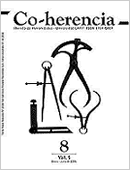Natural Law: Source of Legitimacy of State Power in the Hobbesian Conception
Main Article Content
Keywords
Hobbes, political philosophy, theory of knowledge, state of nature,anthropology, natural law, pact, sovereign State, individualism, Hobbes, political philosophy, theory of knowledge, state of nature, anthropology, natural law, pact, sovereign State, individualism
Abstract
Downloads
References
Hobbes, Thomas (1979) Elementos de derecho natural y político. Madrid, Centro deestudios constitucionales.
Hobbes, Thomas (2000) De Cive. Elementos filosóficos sobre el ciudadano. Madrid, Alianza.
Hobbes, Thomas (2004a) Leviatán. O la materia, forma y poder de una república eclesiástica y civil. México, Fondo de cultura económica.
Hobbes, Thomas (2004b) Tratado sobre el cuerpo. Madrid, Trotta.
Oakeshott, Michael (2000) El racionalismo en política y otros ensayos. México, Fondode cultura económica.
Zarka, Charles Yves (1997) Hobbes y el pensamiento político moderno. Barcelona,Herder.
